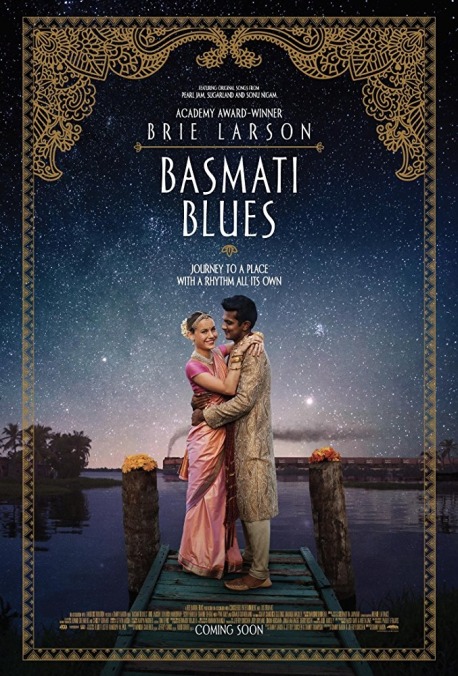Brie Larson's musical Basmati Blues rides the line between charming and embarrassing
Film Reviews Movie Review
Say this for Basmati Blues, the low-budget cross-cultural musical that some of its cast would probably wish away if they could: It is heedless. It does not heed Hollywood’s semi-inexplicable caution over making original musicals (they’re still rare, despite the financial success of movies like La La Land and The Greatest Showman). It does not heed the increasingly frequent warnings to stay the hell away from stories that, like this one about a white scientist (Brie Larson) visiting India to convince farmers to switch to her newly developed form of super-rice, smack of white-savior complexes and stereotypes. And it does not heed any nagging feelings that an Oscar winner and future superhero should run far away from indie musicals with potential white-savior problems.
It arrives at that last bit by accident. Brie Larson shot the movie sometime around 2013, before the release of Short Term 12, and even further before she won an Academy Award for her role in Room. It’s closer in spirit to her little-discussed mid-’00s attempt at Avril-ish pop-rock. In her opening number, she mugs through a solo that starts in a bizarre hybrid of apartment and personal laboratory, and leads to her dancing, mostly unacknowledged, outside New York’s Madison Square Park. Larson appears utterly unembarrassed to be appearing in what could be (and sometimes is) a deeply embarrassing movie where a nerdy scientist travels to India, gives earnest speeches about rice, falls in love, and sings some dopey if catchy songs. That particular heedlessness, however driven by outdated circumstances, is the best thing about Basmati Blues.
It’s a relief to report that the worst thing about Basmati Blues is not white-savior condescension, because while the movie has nothing interesting to say about culture clashes or race relations, it is not about Dr. Linda Watts (Larson) saving India with her super-crop, or teaching anyone Indian much of anything, or even learning life lessons from wise and/or quirky locals. Linda, who works with her father (Scott Bakula), does want to save India—or really, the whole world—with “Rice 9,” a miracle form of basmati rice that requires less water and produces higher yield of crops. She seems oblivious to the presumed in-joke reference to Kurt Vonnegut’s satirical sci-fi novel Cat’s Cradle, but then, Linda is oblivious to lots of things, including the motivations of the agricultural mega-company that employs her. She’s naïve both about certain properties of Rice 9 that will not be advantageous for Indian farmers and the clear warning sign that the head of her company is played by Donald Sutherland.
On her way to eventually figuring out that she might not be working for the good guys, Linda meets Rajit (Utkarsh Ambudkar, of Pitch Perfect and The Mindy Project, among many), who has been forced to leave his university for lack of funds, and has other ideas about how to improve his town’s rice crop. He’s clearly attracted to Linda, as is her company associate William (Saahil Sehgal), but Basmati Blues has blessedly little interest in a drawn-out love triangle or one of those tedious hate-at-first-sight phony-conflict romances. Despite some later clashes (not especially well-defined by the screenplay), Linda and Rajit are swoony-eyed toward each other almost immediately.
A lot of Basmati Blues rests on its musical numbers, and technically speaking, they are not very good. Larson and Ambudkar are capable singers, and Sutherland, who (yes!) does a game bit of speak-singing in the big villain number, is not. But there’s room for both in a modern movie musical; the larger problem is the staging by director-cowriter Dan Baron. Baron has a decent sense of how movie musicals can take advantage of their medium and its ability to project both intimacy and bigger, bolder flourishes, but less sense of how to properly execute these flourishes. He’s made a movie that literally opens on outer space before an epic but cheap-looking zoom that eventually lands on the film’s title carved in a grain of CG rice in an ugly font. In other words, this is an unfortunate combination of hubris and relatively little money or taste.
So while Baron knows he can bend reality with his musical numbers, like a fairly satisfying one where Larson, Ambudkar, and Sehgal all sing alone-yet-together in separate scenes in front of a tilting starry-night background, he never brings any of the numbers to a proper crescendo. Most of them fizzle out, and there aren’t quite enough songs to generate anything resembling a musical flow. The editing throughout is choppy in all areas: scene-to-scene transitions; relatively straightforward montages; and dialogue that sometimes sounds like it’s alluding to unseen musical numbers from the cutting-room hard-drive. A big Bakula-driven number is inexplicably shunted off to the end credits, as if the film got cold feet in the back stretch, unsure if this musical business is going to work out. But Basmati Blues is most endearing when it puts its awkwardness into song, when Larson and her costars stare down embarrassment with their over-emoting faces and warmed-over pop. The movie starts out heedless in its desire to charm, but it winds up feeling constrained by self-consciousness, and more’s the pity. Let Larson and Ambudkar do sexy dances! Let Bakula sing! Let Sutherland try! The unhinged version of this couldn’t be worse than a Mamma Mia! movie. The fudged and long-shelved version practically is already.